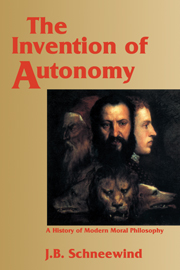Book contents
- Frontmatter
- Contents
- Preface
- Acknowledgments
- A note on references and abbreviations
- Introduction
- Part I The rise and fall of modern natural law
- Part II Perfectionism and rationality
- Part III Toward a world on its own
- 13 Morality without salvation
- 14 The recovery of virtue
- 15 The austerity of morals: Clarke and Mandeville
- 16 The limits of love: Hutcheson and Butler
- 17 Hume: Virtue naturalized
- 18 Against a fatherless world
- 19 The noble effects of self-love
- Part IV Autonomy and divine order
- Epilogue
- Bibliography
- Index of names
- Index of subjects
- Index of biblical citations
14 - The recovery of virtue
Published online by Cambridge University Press: 05 June 2012
- Frontmatter
- Contents
- Preface
- Acknowledgments
- A note on references and abbreviations
- Introduction
- Part I The rise and fall of modern natural law
- Part II Perfectionism and rationality
- Part III Toward a world on its own
- 13 Morality without salvation
- 14 The recovery of virtue
- 15 The austerity of morals: Clarke and Mandeville
- 16 The limits of love: Hutcheson and Butler
- 17 Hume: Virtue naturalized
- 18 Against a fatherless world
- 19 The noble effects of self-love
- Part IV Autonomy and divine order
- Epilogue
- Bibliography
- Index of names
- Index of subjects
- Index of biblical citations
Summary
Carl Friedrich Stäudlin, the first historian to group modern moral philosophers by nationality, claimed that during the eighteenth century British writers on ethics had done more to advance the subject than had the French or the Netherlander, and allowed that they had had considerable influence even in Germany. In his treatment of the British moral philosophers, he assembled, I believe for the first time, those we now consider canonical, though his emphases – two pages on Hobbes, seventeen on Adam Smith – are not ours. Stäudlin rightly noted that the issues with which they were engaged had emerged from a more cosmopolitan debate. If this point has often been ignored, it is partly because in the eighteenth century the British tended to carry on their discussions largely with reference to one another. It is also due to the fact that Selby-Bigge's anthology, British Moralists, first published in 1897, made their writings more readily available than those of their continental counterparts. For these among other reasons, the British moralists have been studied more thoroughly than any comparable group of modern moral philosophers. In presenting the British debate in this and the following chapters I make no effort at a comprehensive discussion. I try to show only how some of the issues generated in the earlier European debates developed in the much envied free and politically stable environment of Britain.
- Type
- Chapter
- Information
- The Invention of AutonomyA History of Modern Moral Philosophy, pp. 285 - 309Publisher: Cambridge University PressPrint publication year: 1997

